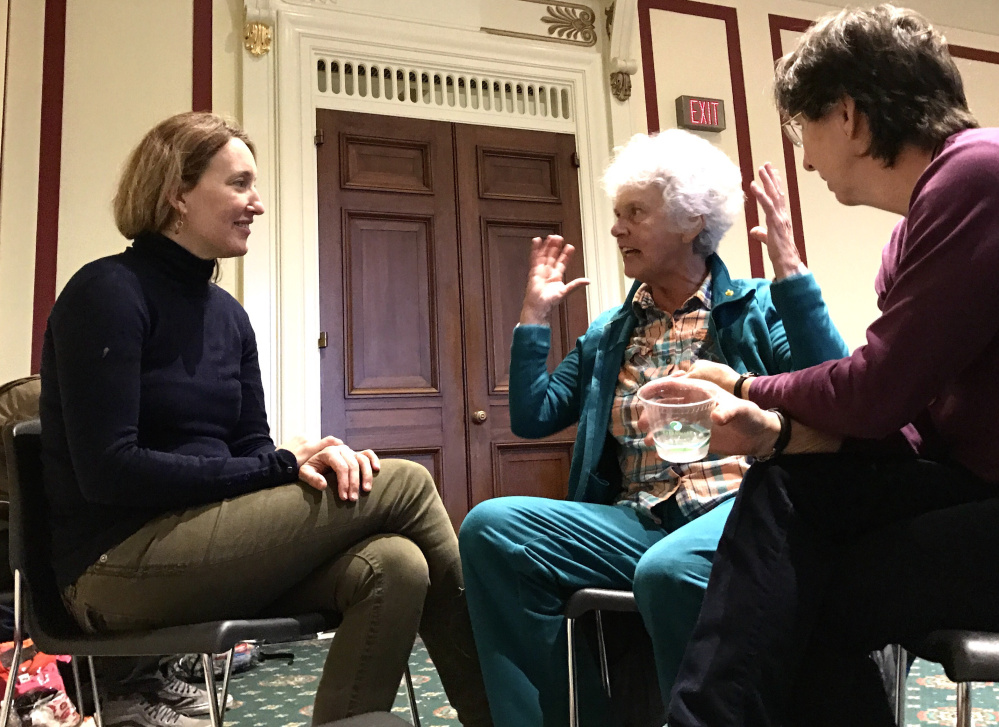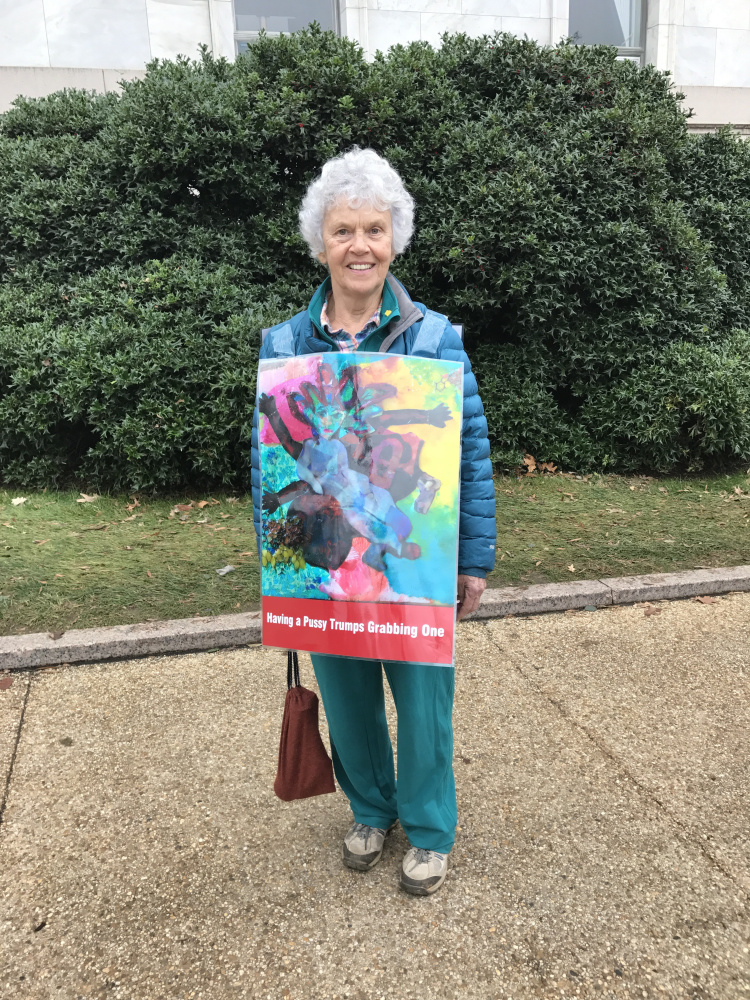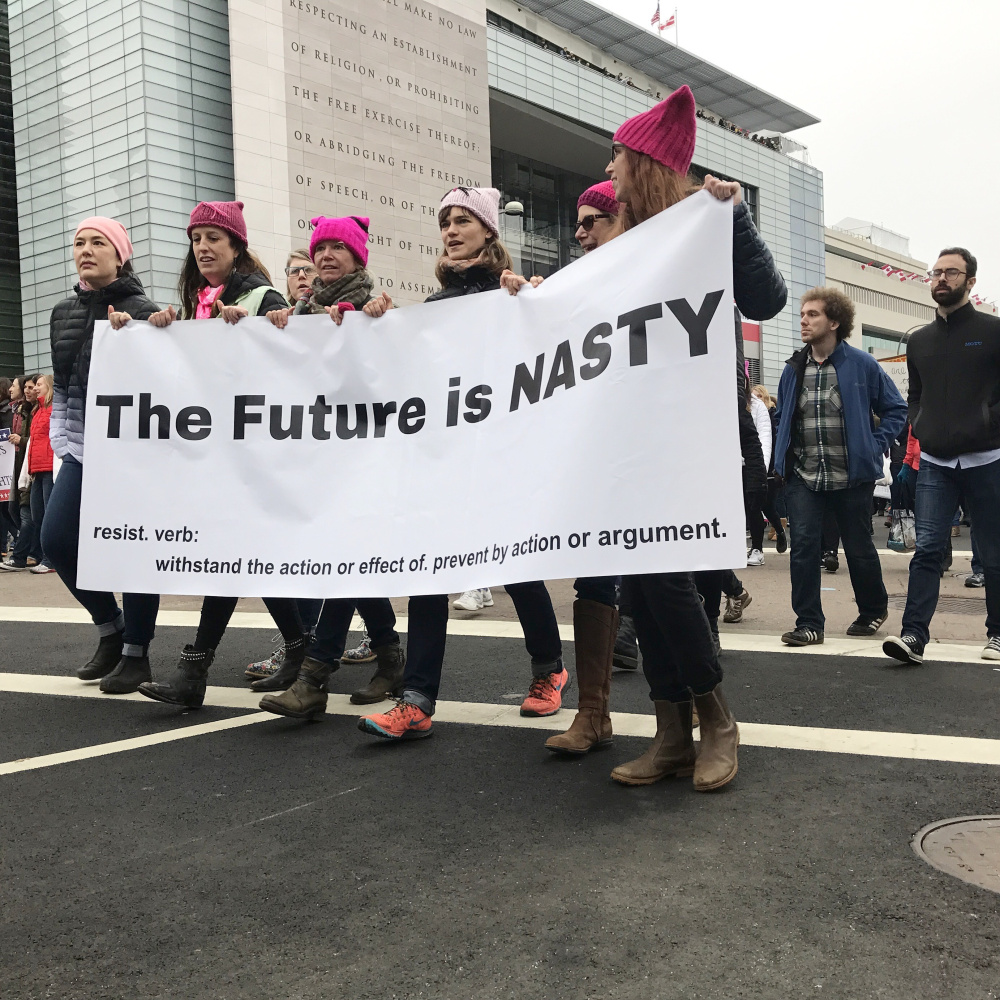WASHINGTON — At the Women’s March on Washington Saturday, the crowd was so thick around the stage during the morning rally that most of the people who traveled from Augusta to D.C. by bus couldn’t hear or see the speakers or entertainers, which included longtime women’s rights activist Gloria Steinem, singer and actress Janelle Monae and the women of “Mothers of the Movement,” whose unarmed African-American children have been killed by gun violence in the United States.
But the large crowd, estimated between a half-million and million people, didn’t diminish the Mainers’ time. Instead it buoyed their spirits.
“For me, it was an amazing experience,” said Lynn Murphy, 56, of Hallowell. “I’ve never been around so many people all there for one cause.”
The purpose of the march Saturday, as laid out by its national committee on the event’s website, was for those who feel threatened by recent political rhetoric, such as immigrants, women, minorities and lesbian, gay, bisexual and transgender people, to stand up and defend human rights they think could be lost under the administration of President Donald Trump.
In addition to the march in Washington, which ended at the White House, an estimated 386 “sister marches” were held in cities around the world, including Augusta and Portland, for those who couldn’t make it to the nation’s capital.
Between 5,000 and 10,000 people marched in Augusta, as well as Portland, according to organizers. An estimated 4,000 people traveled from Maine to Washington, D.C.
The nation’s capital became a sea of people in pink-hued knitted pussyhats, designed to look like cat ears, holding colorful signs that read “Women’s Rights = Human’s Rights,” “We Shall Overcomb,” and “Electile Dysfunction.”
Many people noted how kind and polite other marchers were despite the numbers funneling into one congested area.
“I was just amazed. People were so nice,” Murphy said. “Every time a (metro) bus came in, everybody would roar. There was no panic.”
When the rally ended, there was a pause during which the plan to march was canceled because of the crowd’s size, according to rumors that spread throughout the crowds and was then confirmed by the Washington Post. But then, according to the Post, the march’s national organizers decided to march after all, but in a simpler route going toward the White House.
Two large crowds of marchers merged at 7th and Pennsylvania avenues, cheering, chanting and heading down Pennsylvania Avenue to the White House.
The Chicago march was canceled and changed to a rally because the city was filled to capacity, so a march wasn’t feasible.
A number of Mainers attended a reception held by U.S. Rep. Chellie Pingree, D-1st District, at the Rayburn House Office Building from 2:30 p.m. to 5:30 p.m.
Finally sitting down after a long day in which many walked 8 miles or more, some central Mainers reflected on the march and the current political climate.
Ruth McNiff, 73, of Hallowell, said she decided to march because “so much is at stake.”
“You have to,” she said. “I think people need to do more.”
McNiff attended marches in the 1960s, both in D.C. and Augusta, that addressed issues such as the Vietnam War. She said this march seemed bigger than others she’d been to.
“I thought it would be exciting, but this was really beyond what I thought,” she said. “It’s encouraging to see so many people who want to change things.”
Libby Schecher, a neighbor of McNiff in Hallowell, talked about how the numbers who came from Maine weren’t surprising.
“I think having Gov. (Paul) LePage in Maine has prompted us,” she said.
Genevieve Morgan, the state organizer for Maine, agreed, adding that Mainers have “seen what a rhetoric of hate does.”
Schecher said the march was uplifting for her, but she still worries. She used to work as an engineer, she said, but left the industry she worked in because it was extremely sexist. She now works as an acupuncturist.
“Eight hundred thousand (a preliminary estimate from organizers) came out, but how quickly it can all get reversed,” she said.
Many have called the Women’s March the “start” of a movement to resist potential policies put in motion by the Trump administration. Lynn Murphy agreed, saying, “Now we’ve got to follow it up and put pressure on the administration.”
“What it did is show that people came together,” Murphy said. “They pushed too far this time. (People) don’t want to go back.”
While there are no definite plans for future action yet, march organizers pointed people toward community organizations they can join to continue taking local actions to effect change.
Madeline St. Amour — 861-9239
mstamour@centralmaine.com
Twitter: @madelinestamour
Send questions/comments to the editors.







Success. Please wait for the page to reload. If the page does not reload within 5 seconds, please refresh the page.
Enter your email and password to access comments.
Hi, to comment on stories you must . This profile is in addition to your subscription and website login.
Already have a commenting profile? .
Invalid username/password.
Please check your email to confirm and complete your registration.
Only subscribers are eligible to post comments. Please subscribe or login first for digital access. Here’s why.
Use the form below to reset your password. When you've submitted your account email, we will send an email with a reset code.